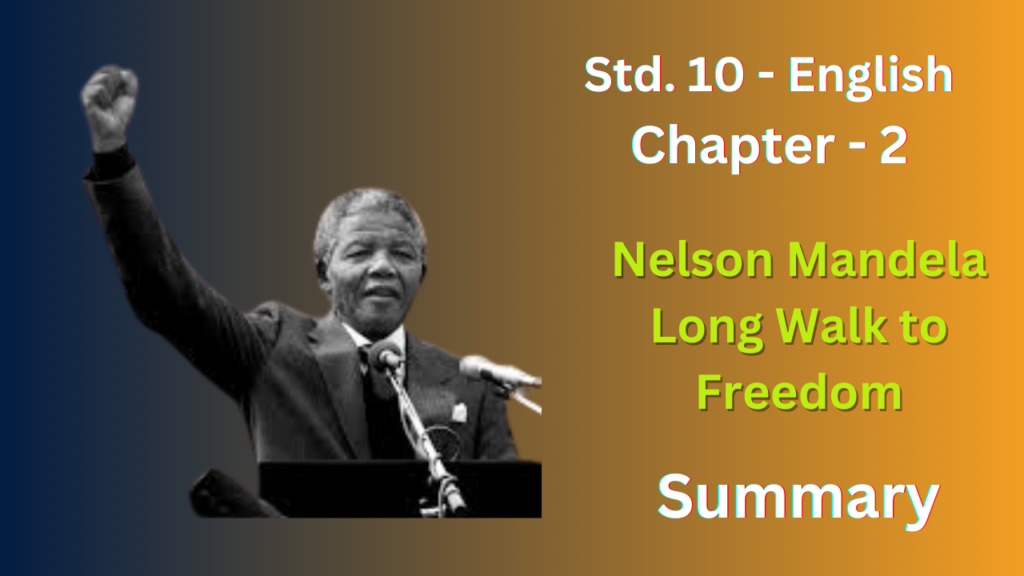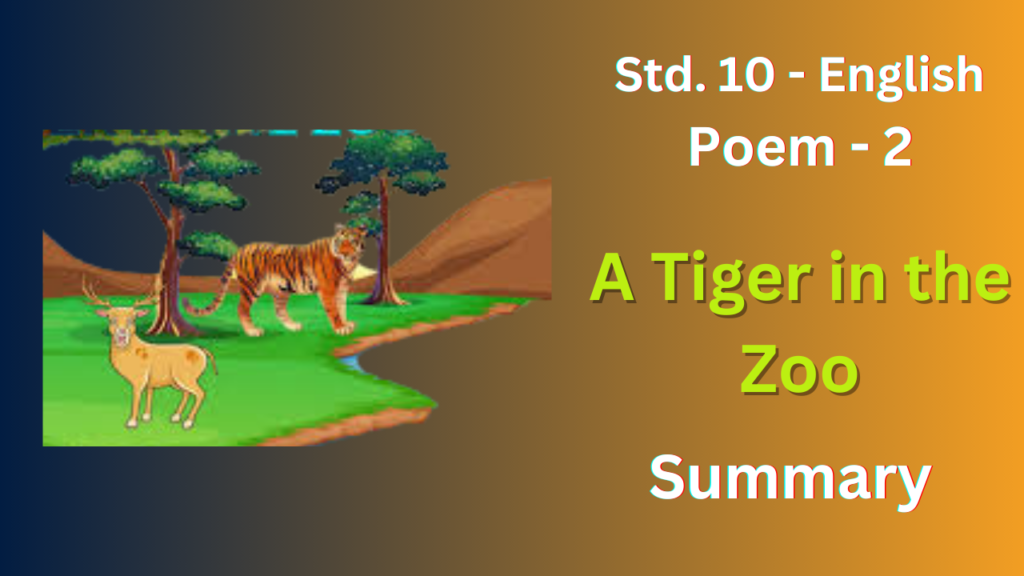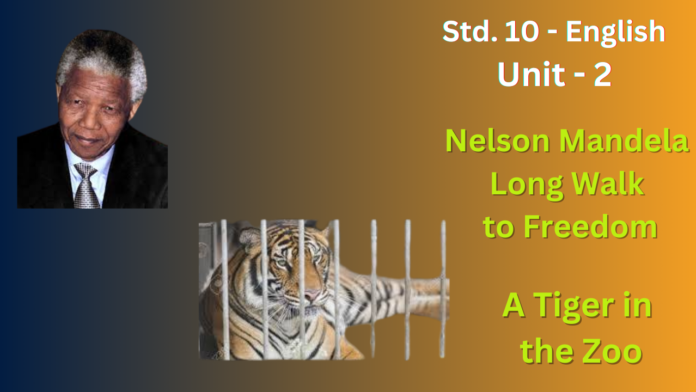Nelson Mandela Long Walk to Freedom
NCERT Solutions for Class 10 English Chapter 2
As you might be reading excerpts from the autobiography “Long Walk to Freedom” by Nelson Mandela in your 10th standard English class, here’s a summary focusing on key points relevant to the curriculum:
Background:
- The chapter introduces Nelson Mandela, a young boy growing up in a rural village in South Africa.
- It highlights the apartheid system, a policy of racial segregation and discrimination against the black majority in South Africa.
Mandela’s Early Life:
- The chapter describes Mandela’s traditional upbringing, his values instilled by his family and the Thembu tribe.
- It touches upon his education and early experiences with injustice under the apartheid regime.
Awakening to Injustice:
- The chapter showcases Mandela’s growing awareness of the unequal treatment faced by black South Africans.
- It mentions his initial steps towards activism, possibly his involvement in student protests.
Focus on the Journey:
- While the full autobiography details Mandela’s entire life struggle against apartheid, the chapter might focus on the beginning of his journey towards activism.
- It might mention his decision to join the African National Congress (ANC), a political party fighting for racial equality.
Themes:
- The excerpt likely explores themes like:
- Fight for Equality: Mandela’s commitment to justice and equal rights for all South Africans.
- Importance of Education: Education as a tool for empowerment and awareness.
- Struggle against Oppression: The fight against the dehumanizing apartheid system.

NCERT Solutions for Class 10 English Chapter 2: Nelson Mandela Long Walk to Freedom
Oral Comprehension Check
1. Where did the ceremonies take place ? Can you name any public buildings in India that are made of sandstones?
Ans : The ceremonies took place on the campus of the Union Buildings in Pretoria and were attended by dignitaries and leaders from many nations. In India, Rashtrapati Bhavan and the Red Fort are notable buildings made of red sandstone.
2. Can you say how 10th May is an ‘autumn day’ in South Africa?
Ans : Since South Africa is in the Southern Hemisphere, May falls during the autumn season. Therefore, the 10th of May is considered an ‘autumn day.’
3. At the beginning of his speech, Mandela mentions “an extraordinary human disaster”. What does he mean by this? What is the “glorious human achievement” he speaks of at the end?
Ans :
- “An extraordinary human disaster”: This refers to the brutal system of apartheid that existed in South Africa for decades. Apartheid enforced racial segregation and discrimination against the black majority, denying them basic rights and freedoms. Mandela is highlighting the immense suffering and injustice caused by this system.
- “Glorious human achievement”: This refers to the establishment of a democratic South Africa where all citizens, regardless of race, have equal rights. Mandela’s inauguration as the first black president marked a significant milestone in this journey. It represented a victory for justice and a new era of hope for the nation.
4. What does Mandela thank the international leaders for ?
Ans : Mandela felt deeply honored to welcome international leaders at the swearing-in ceremony because, not long ago, South Africans were regarded as outlaws. He expressed his gratitude to all who attended to witness this historic event. Their presence was a gesture of international recognition for a newly born free democratic nation and could be seen as a shared victory for justice, peace, and human dignity.
5. What ideals does Nelson Mandela set for the future of South Africa?
Ans : Nelson Mandela’s vision for South Africa’s future was built on several key ideals. He aimed for racial reconciliation, a society where all races lived together peacefully. He emphasized equality, democracy, and social justice for all citizens, regardless of background. Mandela also stressed building a united South Africa while embracing its diversity, and envisioned the nation playing a positive role on the world stage.
NCERT Solutions for Class 10 English Chapter 2: Nelson Mandela Long Walk to Freedom
Oral Comprehension Check
1. What did the military generals do ? How did their attitude change and why?
Ans : Mandela felt deeply honored to welcome international leaders at the swearing-in ceremony because, not long ago, South Africans were regarded as outlaws. He expressed his gratitude to all who attended to witness this historic event. Their presence was a gesture of international recognition for a newly born free democratic nation and could be seen as a shared victory for justice, peace, and human dignity.
2. Why were two national anthems sung?
Ans : Two national anthems were sung at Mandela’s inauguration to symbolize unity and reconciliation. This acknowledged the past under apartheid, where the white population had their own anthem. Singing both anthems showed respect for all South Africans and their heritage, while emphasizing a future of equality for all citizens.
3. How does Mandela describe the systems of government in his country
(i) in the first decade, and
(ii) in the final decade, of the twentieth century?
Ans :
(i) First Decade (1900s):
- Racial Domination: Mandela would likely describe the government as a system of racial domination where the white minority held absolute power.
- Disenfranchisement: Black people, the majority population, were denied basic rights, including the right to vote. This system could be described as a minority rule or an undemocratic system.
- Apartheid: He would highlight the key feature – apartheid, a system of racial segregation and discrimination that enforced this unequal power structure.
(ii) Final Decade (1990s):
- Transition and Hope: By the 1990s, with the dismantling of apartheid, Mandela would likely describe the government as undergoing a transition towards a more democratic system.
- Evolving Democracy: He might express hope for a future with a representative government where all citizens, regardless of race, had the right to participate and have their voices heard.
- Work in Progress: Mandela might acknowledge the challenges of building a true democracy after decades of oppression, but he would likely express optimism for a more just and equitable future.
4. What does courage mean to Mandela?
Ans : For Mandela, courage wasn’t about being fearless. It was about overcoming fear and taking action despite it. He saw courage as the strength to persevere through danger or adversity. His own 27-year imprisonment for fighting apartheid exemplifies this.
5. Which does Mandela think is natural, to love or to hate?
Ans : Nelson Mandela, based on his famous quote, believed that love comes more naturally to the human heart than hate.
Oral Comprehension Check
1. What “twin obligations” does Mandela mention?
Ans :
- Family Duty: This involves caring for your immediate family, including parents, spouse, and children.
- Societal Duty: This refers to a wider responsibility towards your community, nation, and fellow citizens. It’s about contributing to a better society and fighting for justice and equality.
2. What did being free mean to Mandela as a boy, and as a student ? How does he contrast these “transitory freedoms” with “the basic and honourable freedoms”?
Ans : Nelson Mandela’s concept of freedom grew with him. As a boy, freedom meant the simple joys of playing within the confines of his village life. As a student, it expanded to intellectual exploration and new ideas. However, Mandela distinguished these as “transitory freedoms.” True freedom, for him, meant fighting for the “basic and honourable freedoms” of justice, equality, and living without oppression – rights essential for a dignified life. These fundamental rights transcended the limitations of his earlier experiences.
3. Does Mandela think the oppressor is free? Why/why not?
Ans : Nelson Mandela believed oppressors, like the oppressed, are not truly free. Oppressors are imprisoned by their own hate and fear, living with the moral burden of their actions. They rely on violence, creating a state of insecurity. Their limited understanding of the oppressed restricts their own growth. Mandela famously said, “A man who takes away another man’s freedom is a prisoner of hatred,” highlighting that true freedom comes only when both oppressor and oppressed are liberated from injustice.
NCERT Solutions for Class 10 English Chapter 2
Thinking about the Text
1.Why did such a large number of international leaders attend the inauguration ? What did it signify the triumph of?
Ans : A large number of international leaders at Mandela’s inauguration signified a major global victory. Their presence recognized and legitimized South Africa’s new democracy, a world away from the condemned apartheid system. It also symbolized the triumph of human rights and justice, a cause the international community had championed. Furthermore, the leaders’ attendance expressed hope and optimism for a new era of cooperation and a peaceful, just future in South Africa.
2. What does Mandela mean when he says he is “simply the sum of all those African patriots”, who had gone before him ?
Ans : When Mandela says he’s “the sum of all those African patriots,” he expresses humility. He acknowledges the many brave men and women who fought for freedom before him, their sacrifices paving the way for his success. He views himself as part of a long line of resistance, continuing their fight for justice and equality. Mandela’s victory represents a collective achievement, and he feels a deep gratitude to those who came before him.
3. Would you agree that the “depths of oppression” create “heights of character”? How does Mandela illustrate this? Can you add your own examples to this argument ?
Ans : There’s some truth to the idea that oppression can build character. Mandela believed facing hardship fosters resilience, moral clarity, and empathy, leading to strong character. His own imprisonment exemplifies this. However, oppression doesn’t guarantee positive development. History offers examples like Gandhi and Malala who built strong character through resistance. Ultimately, individual strength, support systems, and the specific situation all play a role in how someone responds to oppression.
4. How did Mandela’s understanding of freedom change with age and experience?
Ans : Mandela’s understanding of freedom wasn’t static. As a child, it meant simple joys within his village. In his student years, freedom expanded to intellectual pursuits. However, upon realizing the oppression of apartheid, his concept shifted. Freedom became about fighting for collective liberation, equality, and justice for all South Africans. This journey, as Mandela himself said about courage, wasn’t about being fearless but overcoming fear to fight for a just society.
5. How did Mandela’s ‘hunger for freedom’ change his life?
Ans : Mandela’s “hunger for freedom” wasn’t just a personal yearning. It grew from a desire for his own liberty to a fight for the collective freedom of all black South Africans. This passion fueled his sacrifices, leading him to join the ANC and fight for justice. His unwavering pursuit made him a global symbol, drawing attention to apartheid’s brutality. Even imprisonment couldn’t extinguish his hunger. Upon release, he became a key figure in dismantling apartheid and building a democratic future. Mandela’s legacy proves that a “hunger for freedom” can change not just one life, but an entire nation.
NCERT Solutions for Class 10 English Chapter 2: Nelson Mandela Long Walk to Freedom
Thinking about Language
1. There are nouns in the text (formation, government) which are formed from the corresponding verbs (form, govern) by suffixing – (at)ion or ment. There may be change in the spelling of some verb – noun pairs ; such as rebel, rebellion; constitute, constitution.
Make a list of such pairs of nouns and verbs in the text
| Noun | Verb |
| Rebellion | Rebel |
| Constitution | Constitute |
Ans :
| Noun (formed with suffix) | Verb |
| Rebellion | Rebel |
| Constitution | Constitute |
| Formation | Form |
| Government | Govern |
| Explanation | Explain |
| Punishment | Punish |
| Improvement | Improve |
| Retirement | Retire |
2. Here are some more examples of ‘the’ used with proper names. Try to say what these sentences mean. (You may consult a dictionary if you wish. Look at the entry for ‘the’)
(i) Mr Singh regularly invites the Amitabh Bachchans and the Shah Rukh Khans to his parties.
(ii) Many people think that Madhuri Dixit is the Madhubala of our times.
(in) History is not only the story of the Alexanders, the Napoleons and the Hitlers, but of ordinary people as well.
Ans :
(i) Mr. Singh invites the famous Indian actors Amitabh Bachchan and Shah Rukh Khan (and possibly their families) to his parties.
(ii) Many people believe that the actress Madhuri Dixit is similar to the legendary actress Madhubala of the past, perhaps due to their talent or beauty.
(iii) History shouldn’t just focus on famous conquerors like Alexander the Great, Napoleon Bonaparte, and Adolf Hitler. It should also tell the stories of everyday people.
3. Match, the italicised phrases in Column A with the phrase nearest meaning in Column B.
(Hint: First look for the sentence in the text which the phrase in column A occurs.)
| A | B | |
| 1. I was not unmindful of the fact. | (i) | had not forgotten : was aware of the fact |
| (ii) | was not careful about the fact | |
| (iii) | forgot or was not aware of the fact | |
| 2. When my comrades and I were pushed to our limits | (i) | pushed by the guards to the wall |
| (ii) | took more than our share of beatings | |
| (iii) | felt that we could not endure the suffering any longer | |
| 3. To reassure me and keep me going | (i) | make me go on walking |
| (ii) | help me continue to live in hope in this very difficult situation | |
| (iii) | make me remain without complaining | |
| 4. The basic and honourable freedoms of… earning my keep… | (i) | earning enough money to live on |
| (ii) | keeping what I earned | |
| (iii) | getting a good salary |
Ans :
| Column A | Column B |
| 1. I was not unmindful of the fact. | (i) had not forgotten: was aware of the fact |
| 2. When my comrades and I were pushed to our limits. | (iii) felt that we could not endure the suffering any longer. |
| 3. To reassure me and keep me going. | (ii) help me continue to live in hope in this very difficult situation. |
| 4. The basic and honourable freedoms of… earning my keep… | (i) earning enough money to live on. |
NCERT Solutions for Class 10 English Chapter 2: Nelson Mandela Long Walk to Freedom
A Tiger in the Zoo
The poem “A Tiger in the Zoo” by Leslie Norris describes the plight of a majestic tiger trapped in a small zoo cage. Here’s a summary:
The Tiger’s Condition:
- The poem opens with a description of the tiger’s physical beauty – its stripes and soft paws.
- However, the mood quickly shifts, highlighting the cramped and unnatural environment of the cage.
- The tiger paces restlessly, unable to fully express its natural instincts like hunting or hiding.
Loss of Freedom:
- The poem contrasts the tiger’s current situation with its potential freedom in the wild.
- We imagine the tiger silently yearning for the vastness of the jungle and the thrill of the hunt.
Inner Conflict:
- The zookeepers try to provoke the tiger into roaring, but it remains unresponsive. This suggests a deep sense of apathy and loss of spirit.
Themes:
- The poem explores the theme of captivity and the loss of freedom. It highlights the cruelty of keeping wild animals in confined spaces.
- It also touches upon the contrast between a creature’s natural habitat and the artificiality of a zoo enclosure.

NCERT Solutions for Class 10 English Chapter 2 :A Tiger in the Zoo
Thinking About the Poem
1. Read the poem again and work in pairs or groups to do the following tasks.
1. Find the words that describe the movements and actions of the tiger in the cage and in the wild. Arrange them in two columns.
Ans :
| In the Cage | In the Wild |
| Pacing | Stalking |
| Restless | Hunting |
| Circling | Leaping |
| Stillness | Roaming |
2. Find the words that describe the two places and arrange them in two columns.
Ans :
| The Cage | The Wild |
| Confined space | Vastness |
| Concrete walls | Jungle sounds |
| Bars | Openness |
| Patrolling cars (if present) | Natural scents |
2. Notice the use of a word repeated in lines such as these
1. On pads of velvet quiet, In his quiet rage.
2. And stares with his brilliant eyes At the brilliant stars.
What do you think is the effect of this repetition?
Ans : The poet employs repetition as a device to heighten the intensity of the tiger’s rage and helpless silence. “Velvet quiet” describes the silent, soft pads of the tiger’s feet, which cannot run or leap but can only pace within the confined space of the cage. “Quiet rage” symbolizes the tiger’s suppressed anger and ferocity, yearning to escape into the forest to hunt a deer, yet remaining silent due to its captivity. The repetition of “quiet” adds immense beauty to the poem. Additionally, the use of “brilliant” to describe both the tiger’s eyes and the stars enhances the magnificence of these lines. The tiger gazes at the brilliant stars with his brilliant eyes, dreaming of the beautiful life he could have in the forest. This repetition creates a wonderful effect in the poem.
NCERT Solutions for Class 10 English Chapter 2 :A Tiger in the Zoo
3. Read the following two poems one about a tiger and the other about a panther. Then discuss:
Are zoos necessary for the protection or conservation of some species of animals?
Are they useful for educating the public?
Are there alternatives to zoos?Ans : Several species of animals are on the verge of extinction. Even tigers and lions are not safe in the forest due to poaching for trade and other purposes. Therefore, zoos are necessary for the protection and conservation of these species. Zoos provide a safe environment and can educate the public about the importance of wild animals and their role in maintaining ecological balance. Alternatives to zoos include wildlife sanctuaries, reserves, and national parks. These not only aid in the protection and conservation of species but also offer them a natural habitat.
NCERT Solutions for Class 10 English Chapter 2
FAQs
What is Chapter 2 ‘Nelson Mandela: Long Walk to Freedom’ about?
It describes Nelson Mandela’s journey from being a freedom fighter to becoming South Africa’s first Black president, highlighting his struggle against apartheid.
What can students learn from this chapter?
Students learn about courage, equality, and the importance of fighting for justice and human rights.
How do NCERT Solutions help in studying this chapter?
NCERT Solutions provide clear and accurate answers that help students understand key concepts and prepare well for exams.
Who wrote ‘Long Walk to Freedom’?
‘Long Walk to Freedom’ is an autobiography written by Nelson Mandela himself, sharing his real-life experiences.
Where can I find free NCERT Solutions for Class 10 English Chapter 2?
You can find free NCERT Solutions for Class 10 English Chapter 2 – Nelson Mandela: Long Walk to Freedom – on trusted educational websites and learning apps.


